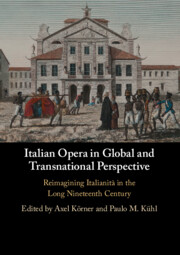 Italian Opera in Global and Transnational Perspective
Italian Opera in Global and Transnational Perspective Book contents
- Italian Opera in Global and Transnational Perspective
- Italian Opera in Global and Transnational Perspective
- Copyright page
- Contents
- Figures
- Tables
- Examples
- Notes on Contributors
- Preface and Acknowledgements
- 1 Opera and Italianità in Transnational and Global Perspective
- 2 Giving Singers a Voice
- 3 Nina d’Aubigny’s ‘Italian Voice’
- 4 Italian Opera and Creole Identities
- 5 Italian Opera in Vormärz Vienna
- 6 Southern Exchanges
- 7 ‘For a Moment, I Felt Like I Was Back in Italy’
- 8 Reimagining Rossini
- 9 From Heaven and Hell to the Grail Hall via Sant’Andrea della Valle
- 10 Arcadia Undone
- 11 Italian Impresarios, American Minstrels and Parsi Theatre
- 12 German National Identity and Operatic Italianità
- 13 (Opera) Fever in Belle Époque Manaus
- 14 Between ‘Sung Theatre’ and Asakusa Opera
- 15 Epilogue
- Index
5 - Italian Opera in Vormärz Vienna
Gaetano Donizetti, Bartolomeo Merelli and Habsburg Cultural Policies in the Mid-1830s
Published online by Cambridge University Press: 17 March 2022
- Italian Opera in Global and Transnational Perspective
- Italian Opera in Global and Transnational Perspective
- Copyright page
- Contents
- Figures
- Tables
- Examples
- Notes on Contributors
- Preface and Acknowledgements
- 1 Opera and Italianità in Transnational and Global Perspective
- 2 Giving Singers a Voice
- 3 Nina d’Aubigny’s ‘Italian Voice’
- 4 Italian Opera and Creole Identities
- 5 Italian Opera in Vormärz Vienna
- 6 Southern Exchanges
- 7 ‘For a Moment, I Felt Like I Was Back in Italy’
- 8 Reimagining Rossini
- 9 From Heaven and Hell to the Grail Hall via Sant’Andrea della Valle
- 10 Arcadia Undone
- 11 Italian Impresarios, American Minstrels and Parsi Theatre
- 12 German National Identity and Operatic Italianità
- 13 (Opera) Fever in Belle Époque Manaus
- 14 Between ‘Sung Theatre’ and Asakusa Opera
- 15 Epilogue
- Index
Summary
The chapter discusses the role of Italian opera in Habsburg Vienna in relation to the cultural policies promoted by Austrian Emperor Ferdinand I (1835-48). It examines previously unknown negotiations between Donizetti and the Kärntnertortheater in the mid-1830s, emerging from recently discovered archival documents. These negotiations were part of an administrative reorganisation of the Kärntnertortheater aimed at reintroducing regular Italian opera seasons in Vienna, which had lapsed since the Italian impresario Domenico Barbaja left the city in 1828. The new impresario for Vienna’s Italian opera seasons, Bartolomeo Merelli, enjoyed an extensive business network in Italy. As the chapter shows, his appointment in Vienna was key to the reinforcement of Vienna’s cultural ties with Italy's major operatic centres. Together with Donizetti he maintained important connections with the Viennese aristocracy, which helped to sustain their professional and creative endeavours in the imperial capital. By focusing on this turning point in the nineteenth-century history of opera in Vienna, the chapter demonstrates how, at a time when national ideologies were spreading both north and south of the Alps, Italian opera became instrumental in asserting the supranational identity of the Austrian Empire.
Keywords
- Type
- Chapter
- Information
- Italian Opera in Global and Transnational PerspectiveReimagining Italianità in the Long Nineteenth Century, pp. 96 - 112Publisher: Cambridge University PressPrint publication year: 2022
- 1
- Cited by
